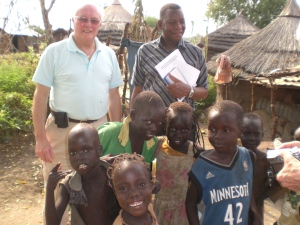As we enter 2018 I’m reminded that I haven’t shared any information about our work in Sudan and South Sudan recently – so its time to correct that – with my apologies for not keeping our readers up to date.
In truth I have been producing regular reports over the last few years but haven’t included them in our blog as I should have done! Anyway I promise to put this right…..and also promise that I wont inundate our readers with a load of stuff in one go; I’ll give it to you in bit sized bits.
For various reasons we haven’t been able to visit either Sudan or South Sudan for a number of years. But good news! In October we were delighted to welcome Dr Betram Kuol who manages our programmes in Juba who visited us here; whilst in November I visited our members in Khartoum with Helen O’Shea our new National President in England & Wales. We found that as in the rest of the world our members in the Khartoum area work one-to-one with those in need. However, the country is beset with problems caused by 60 years of civil war and the displacement of millions of people. As a result some major programmes have been developed including medical centres, water distribution, baby feeding, foster homes for street children, and vocational training. The last two programmes (foster homes and VT) were costly, labour intensive and difficult to manage and have now been closed. At the moment medical clinics are limited to the men’s and women’s prisons, 13 of the previous 16 baby feeding centres are operational and the water programme is running at reduced capacity due to shortage of funds and technical problems.
As a result of the famine reported in South Sudan our members are looking after the immediate needs of 13,000 internally displaced people in 2 IDP camps. Kworijik Camp – 5,430 people, funded 100% by SVP England & Wales whilst Mahad Camp – 7,752 people funded by SVP England & Wales in partnership with the World Food Programme. Emergency funding has been provided through our Disaster Fund but our members in Juba need to know what funding is available for the next year at least. This is in addition to the normal work of the Conferences
So that’s where we are at the moment…..More news coming soon!
Ian Mawdsley
